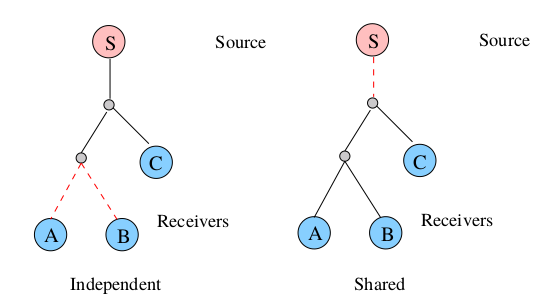
Links
Abstract
Current reliable multicast protocols do not have scalable congestion control mechanisms and this deficiency leads to concerns that multicast deployment may endanger stability of the network. In this paper, we present a sender-based approach for multicast congestion control targeted towards reliable bulk data transfer. We assume that there are a few bottleneck links in a large scale multicast group at any time period and these bottlenecks persist long enough to be identified and adapted to. Our work focus on dynamically identifying the worst congested path in the multicast tree and obtaining TCP-friendly throughput on this selected path. We devise novel selection (amongst receivers) and aggregation (over time) methods to achieve our goal. The response time of our protocol is then compatible to TCP once the worst path is identified. Only when switching between worst paths, the protocol response time is relaxed to multiple RTTs (less than 10) for the reasons of scalability and stability. We use the network simulator (NS2) to validate and evaluate our congestion control algorithm with both drop-tail and RED gateways.
BibTeX (Download)
@inproceedings{Shi2000Rate-based,
title = {A Rate-based End-to-end Multicast Congestion Control Protocol},
author = {Sherlia Shi and Marcel Waldvogel},
url = {https://netfuture.ch/wp-content/uploads/2000/shi00ratebased.pdf},
year = {2000},
date = {2000-01-01},
urldate = {1000-01-01},
booktitle = {Proceedings of ISCC 2000},
pages = {678-686},
address = {Antibes, France},
abstract = {Current reliable multicast protocols do not have scalable congestion control mechanisms and this deficiency leads to concerns that multicast deployment may endanger stability of the network. In this paper, we present a sender-based approach for multicast congestion control targeted towards reliable bulk data transfer. We assume that there are a few bottleneck links in a large scale multicast group at any time period and these bottlenecks persist long enough to be identified and adapted to. Our work focus on dynamically identifying the worst congested path in the multicast tree and obtaining TCP-friendly throughput on this selected path. We devise novel selection (amongst receivers) and aggregation (over time) methods to achieve our goal. The response time of our protocol is then compatible to TCP once the worst path is identified. Only when switching between worst paths, the protocol response time is relaxed to multiple RTTs (less than 10) for the reasons of scalability and stability. We use the network simulator (NS2) to validate and evaluate our congestion control algorithm with both drop-tail and RED gateways. },
keywords = {Multicast, Quality of Service},
pubstate = {published},
tppubtype = {inproceedings}
}
Technical Report
An extended version of the article above is available as a technical report:

BibTeX (Download)
@techreport{Shi2000Rate-based-techreport,
title = {A Rate-based End-to-end Multicast Congestion Control Protocol},
author = {Sherlia Shi and Marcel Waldvogel},
url = {https://netfuture.ch/wp-content/uploads/2000/shi00ratebased-techreport.pdf},
year = {2000},
date = {2000-01-01},
urldate = {1000-01-01},
number = {WUCS-00-03},
institution = {Department of Computer Science, Washington University in St. Louis},
keywords = {Multicast, Quality of Service},
pubstate = {published},
tppubtype = {techreport}
}



